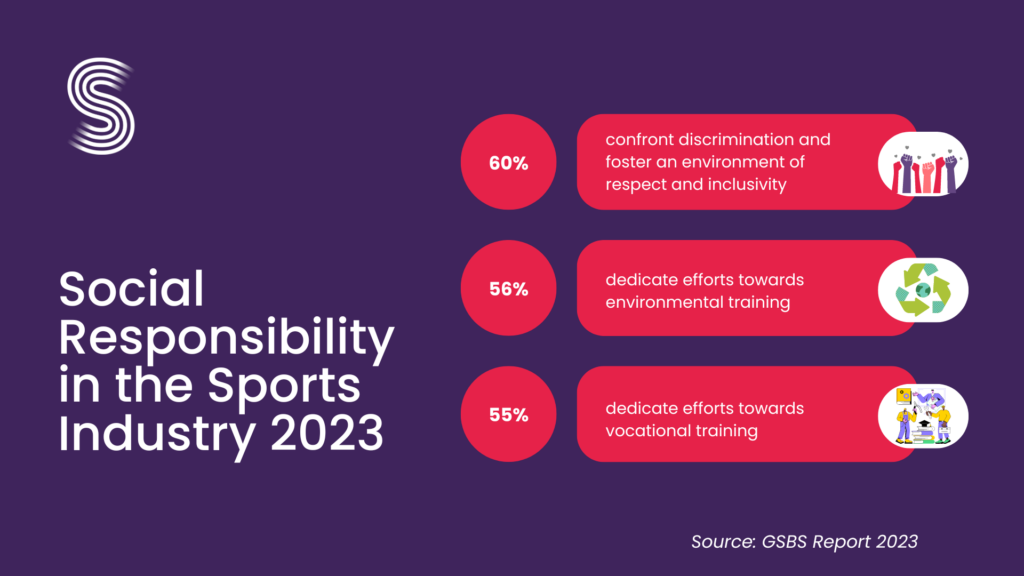
2023 highlights social responsibility towards employees as a game changer in sports
Can an industry famed for its competitive spirit also lead the charge in championing social responsibility? The Global Sustainability Benchmark in Sports (GSBS) Report 2023 opens a window into how these organizations are making a significant impact, not just through their athletic endeavors but in nurturing the communities and employees at their core.
The vital role of social responsibility in the sports industry
Corporate social responsibility (CSR) in the sports industry encompasses a broad range of practices – from promoting health and well-being across communities to advocating for social justice and environmental sustainability. Clubs like FC Porto are pioneering this movement, demonstrating that integrating social responsibility into the core operations can create a ripple effect of positive change.
This deep integration into the societal fabric underscores the immense potential sports organizations have in shaping a better world. But it also brings to light the importance of their commitment to their internal community — their employees. Why does understanding social responsibility towards employees matter, though?
The imperative of transparency
In today’s increasingly conscientious world, understanding an employer’s commitment to social responsibility is not just beneficial—it’s imperative. For job seekers, employees, and hiring authorities in the sports industry, this knowledge provides an aid for navigating ethical careers. It allows professionals to align their values with an employer that not only aims for business success but also contributes positively to society and their own workforce. For the younger workforce, in particular, this alignment could be as crucial as the financial rewards, marking a shift in what constitutes a desirable workplace.

A proactive approach to inclusion and sustainability
Revealing a heartening trend, the GSBS Report 2023 notes that over half of the sports organizations are actively fostering an inclusive and environmentally sustainable work environment. With 56% of organizations dedicating efforts towards environmental training and 55% towards vocational training, the industry is not just aiming for environmental stewardship but is also deeply invested in the growth and welfare of its employees.
Furthermore, with 60% of sports entities actively confronting discrimination, sexual harassment, antisemistim and racism, and fostering an environment of respect and inclusivity, we’re seeing the an industry undergoing a profound transformation. The numbers suggest a shift towards careers within the sports domain that are not only about (athletic) excellence but also embody a deep-seated commitment to making a positive impact and improving employee well-being.
The path to inclusivity is an ongoing journey
Despite these strides, we’re faced with a stark reminder of where the journey towards true inclusivity in the sports industry is only just beginning. While it’s commendable that a significant portion of organizations are actively engaging in CSR towards employees, the revelation that only 18% have peeled back the curtain on the gender and age demographics of their employees – with even fewer disclosing information on ethnicity (11%) and disability or inclusion (13%) – emphasizes the need for continued efforts to bridge the gap in data transparency.
By bringing numbers to the light, organizations acknowledge every individual’s contribution, celebrating diversity, and paving the way for a more inclusive environment. It’s about humanizing our workforce, recognizing the unique stories behind the numbers, and understanding that true strength in the sports industry comes from its diversity.
Behind the GSBS Report 2023: How was the data gathered?
The GSBS Report 2023 stands on the foundation of meticulous research, encompassing up to 1,700 data points across the spectrum of sustainability. This comprehensive framework is designed to encourage sports organizations worldwide to collect, understand, and disclose data related to corporate, environmental, social, and governance aspects. The high response rate from nearly 500 invited organizations reflects a growing commitment within the industry to transparency and improvement.
Guiding job seekers and organizations alike
For those on the lookout for opportunities or already within the sports industry, the GSBS Report 2023 highlights a crucial criterion for evaluating potential employers. The importance of aligning with organizations where respect and inclusivity are becoming foundational to the workplace culture cannot be overstated.
The findings also serve as a reminder for organizations to shift towards more transparent, diverse, and employee-focused practices, as it not only elevates an organization’s standing within the industry but also magnetizes a talent pool eager to contribute to a sector with values.
Forward steps for greater transparency and inclusivity
For sports organizations keen on enhancing their transparency and inclusivity, the path forward involves several key strategies. Firstly, adopting more sophisticated data collection and analysis methods can shed light on areas needing attention, from workforce diversity to environmental impact. Additionally, fostering a culture of open dialogue and feedback within organizations encourages inclusivity and helps identify and address potential barriers to implementing social responsibility initiatives. Last not least, collaborating with external experts and leveraging technology for better monitoring and reporting can also play a crucial role in improving transparency.
The sports industry’s role in a responsible future
The GSBS Report 2023 reveals both the accomplishments and the challenges in employee CSR initiaitves, offering a comprehensive blueprint for building a more inclusive, transparent, and ethically governed industry. The sports industry demonstrates that competitive spirit and social responsibility are not mutually exclusive but are, in fact, complementary forces driving towards a more equitable and sustainable future.

Share
Facebook
Twitter
LinkedIn
Telegram
Tumblr
WhatsApp
VK
Mail